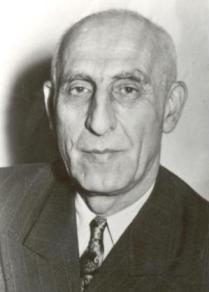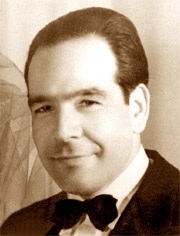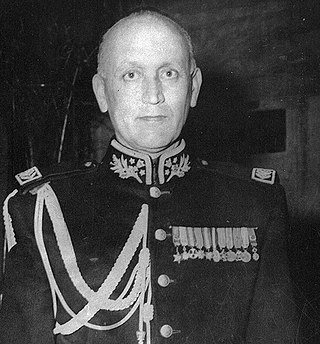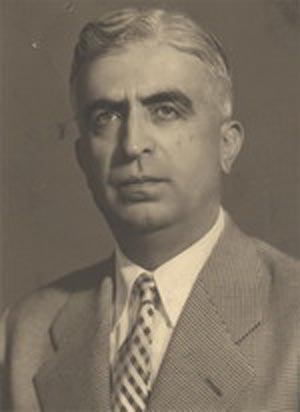
Mohammad Mosaddegh was an Iranian politician, author, and lawyer who served as the 35th Prime Minister of Iran from 1951 to 1953, after appointment by the 16th Majlis. He was a member of the Iranian parliament from 1923, and served through a contentious 1952 election into the 17th Iranian Majlis, until his government was overthrown in the 1953 Iranian coup d'état aided by the intelligence agencies of the United Kingdom (MI6) and the United States (CIA), led by Kermit Roosevelt Jr. His National Front was suppressed from the 1954 election.

The 1953 Iranian coup d'état, known in Iran as the 28 Mordad coup d'état, was the U.S.- and UK-instigated, Iranian army-led overthrow of the democratically elected Prime Minister Mohammad Mosaddegh in favor of strengthening the monarchical rule of the shah, Mohammad Reza Pahlavi, on 19 August 1953. It was aided by the United States and the United Kingdom. The clergy also played a considerable role.

Liberalism in Iran or Iranian liberalism is a political ideology that traces its beginnings to the 20th century.

The National Front of Iran is an opposition political organization in Iran, founded by Mohammad Mosaddegh in 1949. It is the oldest and arguably the largest pro-democracy group operating inside Iran despite having never been able to recover the prominence it had in the early 1950s.

All the Shah's Men: An American Coup and the Roots of Middle East Terror is a book written by American journalist Stephen Kinzer. The book discusses the 1953 Iranian coup d'état backed by the U.S. Central Intelligence Agency (CIA) in which Mohammed Mossadegh, Iran's democratically elected prime minister, was overthrown by Islamists supported by American and British agents and royalists loyal to Shah Mohammad Reza Pahlavi.

Hossein Fatemi was an Iranian scholar. A close associate of Prime Minister Mohammad Mosaddegh, he proposed nationalization of Iranian oil and gas assets. Initially a journalist, he served as minister of foreign affairs from 1951 to 1953. After the 1953 coup d'état toppled the government of Mosaddegh, Fatemi was arrested, tortured, and convicted by a military court of "treason against the Shah", and executed by a firing squad.
The Abadan Crisis was a major event in Iranian history. It began in 1951 with the nationalization of the Anglo-Iranian Oil Company by the government of Iran, and the shutting down by the British of the Anglo-Iranian Oil Company's huge oil refinery in Abadan. It ended with a successful CIA-orchestrated coup which overthrew the democratically elected government of Mohammed Mosaddeq in 1953, and enabled the Shah to rule autocratically for the next 26 years, before he was overthrown by the Iranian Revolution.

Parliamentary elections were held in Iran in 1952 to elect the 17th Iranian Majlis.
A referendum on the dissolution of Parliament, the first referendum ever held in Iran, was held in August 1953. The dissolution was approved by more than 99% of voters.

Parliamentary elections were held in Iran in 1950.
Events from the year 1953 in Iran.

The nationalization of the Iranian oil industry resulted from a movement in the Iranian parliament (Majlis) to seize control of Iran's oil industry, which had been run by private companies, largely controlled by foreign interests. The legislation was passed on March 15, 1951, and was verified by the Majlis on March 17, 1951. The legislation led to the nationalization of the Anglo-Iranian Oil Company (AIOC). The movement was led by Mohammad Mosaddegh, a member of the Majlis for the National Front and future prime minister of Iran. The movement to nationalize the oil industry was the reaction to the following concessions made by Iran to foreign powers: the Reuter concession of 1872, proceeding letter,D'Arcy Concession?] the 1933 agreement between the Iranian government and AIOC, and the Gas-golshaian[?] contract. According to the political scientist Mark J. Gasiorowski, the oil nationalization movement had two major results: the establishment of a democratic government and the pursuit of Iranian national sovereignty.

The premiership of Mohammad Mosaddegh began when his first government was formed on 28 April 1951 and ended on 19 August 1953, when his second government was overthrown by the American–British backed coup d'état. During the time, the two cabinets of Mosaddegh took control except for a brief period between 16 and 21 July 1952, in which Ahmad Qavam was the Prime Minister, taking office due to resignation of Mosaddegh from premiership and deposed by Shah after five days of mass demonstrations.

Abdol Hossein Hejazi (1904–1969) was an Iranian military officer who served as the commander of the Imperial Iranian Army's Ground Forces between 1958 and 1960.
Mehdi Azar (1901–1994) was an Iranian physician, professor of medicine and politician who served as the minister of culture in the period 1952–1953. In addition to his political activities he was one of the leading Iranian physicians in kidney disease.

Nader Batmanghelidj (1904–1998) was an Iranian military officer who served in various military and government posts. He also served as the ambassador of Imperial Iran to Pakistan and Iraq.
Atash was a Persian language right-wing newspaper which was published from 1946 to 1947 in Tehran, Iran.

The cabinet led by Haj Ali Razmara was formed on 26 June 1950 and succeeded the cabinet led by Ali Mansur who was in office between April and June 1950. Razmara was a lieutenant general at the imperial army and was serving as the chief of the general staff when he was appointed by the Shah Mohammad Reza Pahlavi as the prime minister. It was the 33rd and first military cabinet in Iran since 1924. Behrooz Moazami also argues that it was one of the cabinets which did not follow the political agenda of the Shah in addition to the cabinets of Mohammad Mosaddegh and those of Ahmad Qavam in the Pahlavi rule. The Razmara cabinet ended on 11 March 1951 three days after the assassination of the prime minister.

Hassan Akhavi (1908–1992) was an Iranian military officer who played an active role in the overthrown of Prime Minister Mohammad Mosaddegh in 1953. He briefly served as the minister of agriculture in the period 1957–1959 and retired from military offices and politics. Following the regime change in Iran in 1979 he settled in the United States.
Hedayatollah Gilanshah (1907–1986) was the commander of the Imperial Iranian Air Force for three terms. He was among the individuals who contributed to the development of the Iranian air force. In addition, he was one of the army officers who played an active in the coup against Prime Minister Mohammad Mosaddegh in 1953.













